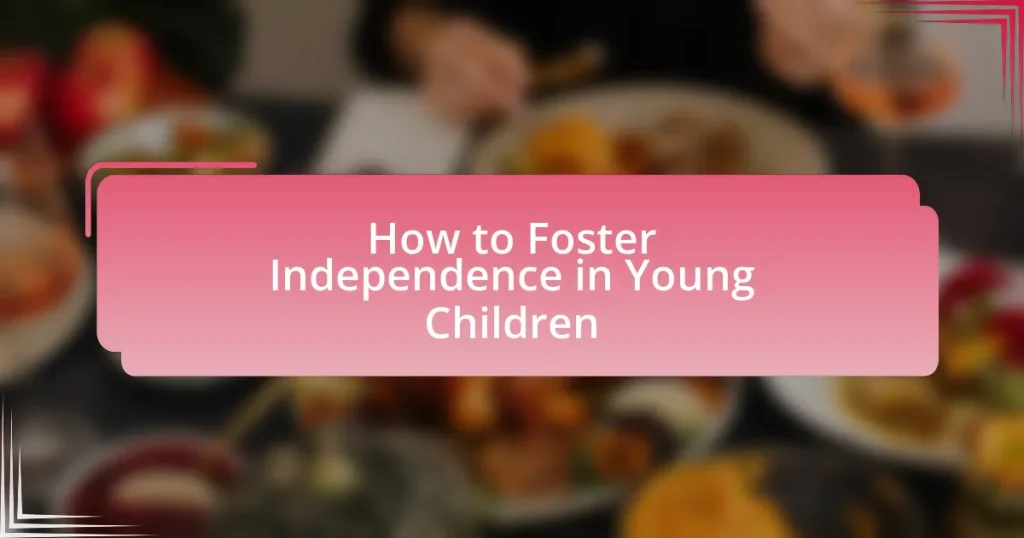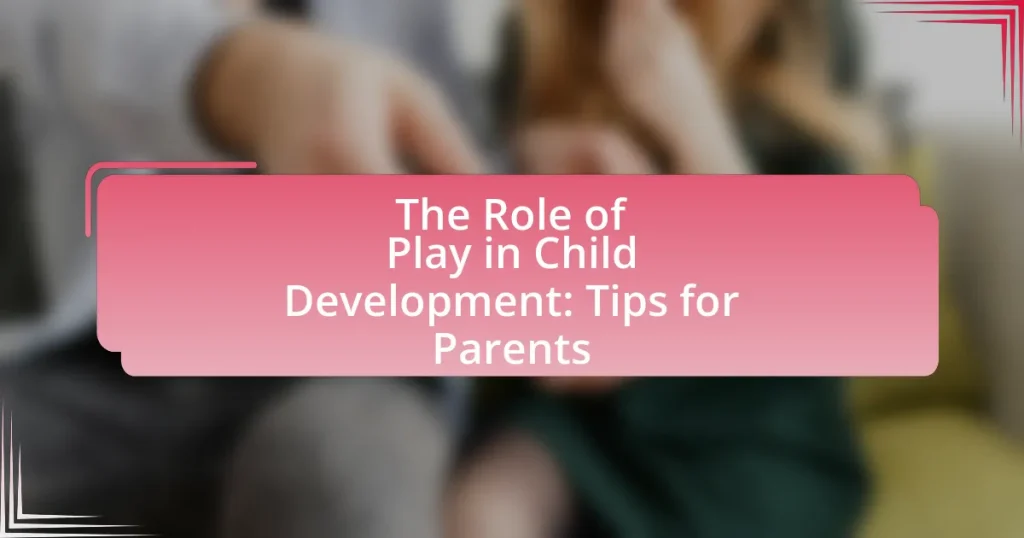Fostering independence in young children is essential for their development, as it encourages self-reliance, confidence, and problem-solving skills. This article explores the significance of promoting autonomy in early childhood, detailing how independence impacts self-esteem and cognitive growth. Key principles for fostering independence include encouraging decision-making, providing opportunities for self-care, and creating a supportive environment. Additionally, the article addresses common challenges parents may face, strategies to encourage independence, and practical tips for integrating independence into daily routines. Resources for parents seeking to enhance their children’s self-sufficiency are also highlighted.
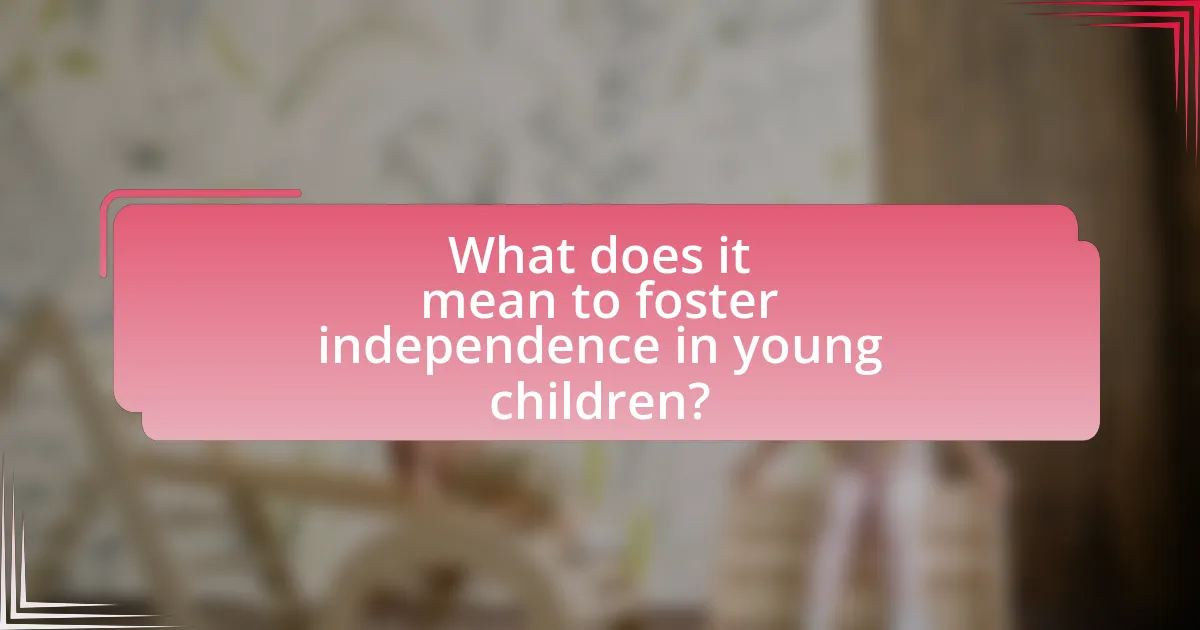
What does it mean to foster independence in young children?
Fostering independence in young children means encouraging them to perform tasks and make decisions on their own, which promotes self-reliance and confidence. This process involves providing opportunities for children to explore, learn, and solve problems independently, while also offering guidance and support when necessary. Research indicates that children who are given the chance to make choices and take responsibility for their actions develop better problem-solving skills and higher self-esteem, as highlighted in studies by the American Psychological Association.
Why is fostering independence important for child development?
Fostering independence is crucial for child development because it enhances self-esteem and problem-solving skills. When children are encouraged to make choices and take responsibility for their actions, they develop a sense of autonomy that is essential for their emotional and cognitive growth. Research indicates that children who experience independence in their early years are more likely to exhibit resilience and adaptability later in life, as they learn to navigate challenges and make decisions confidently. This foundational skill set is supported by studies showing that autonomy in childhood correlates with higher academic achievement and better social skills in adolescence.
How does independence impact a child’s self-esteem?
Independence positively impacts a child’s self-esteem by fostering a sense of competence and self-worth. When children are allowed to make choices and take on responsibilities, they develop problem-solving skills and confidence in their abilities. Research indicates that children who experience autonomy in their activities are more likely to feel capable and valued, which directly correlates with higher self-esteem levels. For instance, a study published in the Journal of Child Development found that children who engage in independent play demonstrate greater self-confidence and resilience, reinforcing the idea that independence is crucial for healthy self-esteem development.
What role does independence play in problem-solving skills?
Independence significantly enhances problem-solving skills by fostering critical thinking and self-reliance. When individuals are encouraged to tackle challenges independently, they develop the ability to analyze situations, generate solutions, and evaluate outcomes without relying on external guidance. Research indicates that children who engage in independent problem-solving activities demonstrate improved cognitive flexibility and creativity, which are essential components of effective problem-solving. For instance, a study published in the Journal of Educational Psychology found that children who participated in self-directed learning exhibited higher levels of problem-solving ability compared to those who received direct instruction. This evidence underscores the importance of independence in cultivating robust problem-solving skills.
What are the key principles of fostering independence?
The key principles of fostering independence in young children include encouraging decision-making, promoting problem-solving skills, and providing opportunities for self-care. Encouraging decision-making allows children to make choices, which builds confidence and autonomy. Promoting problem-solving skills helps children learn to navigate challenges independently, fostering resilience. Providing opportunities for self-care, such as dressing themselves or preparing simple meals, enhances their sense of responsibility and capability. Research indicates that children who engage in these practices develop greater self-esteem and are better prepared for future challenges.
How can caregivers create a supportive environment for independence?
Caregivers can create a supportive environment for independence by providing opportunities for children to make choices and engage in self-directed activities. This approach encourages autonomy and decision-making skills, which are essential for developing independence. For instance, allowing children to select their clothing or choose between different snacks fosters a sense of control and responsibility. Research indicates that children who are given choices are more likely to develop self-confidence and problem-solving abilities, as highlighted in studies by the American Psychological Association, which emphasize the importance of autonomy in early childhood development.
What strategies can be used to encourage decision-making in young children?
To encourage decision-making in young children, caregivers can implement strategies such as providing choices, modeling decision-making processes, and creating a supportive environment. Offering children a limited range of choices empowers them to make decisions, fostering a sense of autonomy. For example, allowing a child to choose between two snacks or selecting their outfit for the day encourages them to weigh options and make independent choices.
Modeling decision-making involves demonstrating how to evaluate options and consider consequences, which helps children learn the process. For instance, discussing the reasons behind a choice, such as selecting a book to read based on interest, teaches children to think critically about their decisions.
Creating a supportive environment means encouraging children to express their opinions and validating their feelings, which builds their confidence in making choices. Research indicates that children who practice decision-making in a supportive context develop better problem-solving skills and self-regulation (Ginsburg, 2007, American Academy of Pediatrics). These strategies collectively enhance children’s ability to make informed decisions, promoting their independence.
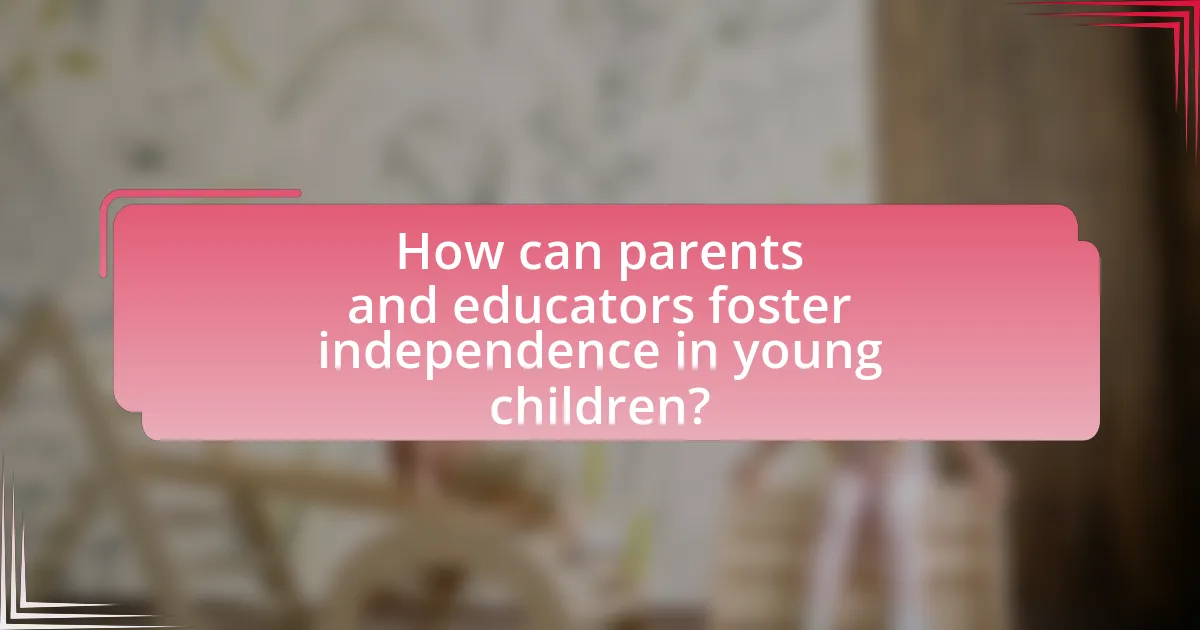
How can parents and educators foster independence in young children?
Parents and educators can foster independence in young children by providing opportunities for decision-making and problem-solving. Allowing children to choose their activities, select their clothing, or solve simple problems encourages them to think critically and develop confidence in their abilities. Research indicates that children who are given choices are more likely to develop a sense of autonomy and self-efficacy, which are crucial for independent behavior. For example, a study published in the Journal of Experimental Child Psychology found that children who engaged in self-directed play demonstrated greater problem-solving skills and creativity. By creating an environment that supports exploration and self-reliance, parents and educators can effectively nurture independence in young children.
What activities promote independence in daily routines?
Activities that promote independence in daily routines include self-care tasks such as dressing, grooming, and feeding. Engaging children in these activities allows them to develop essential life skills and boosts their confidence. For instance, research indicates that children who practice dressing themselves show improved motor skills and self-esteem, as they learn to manage their own needs effectively. Additionally, involving children in household chores, like setting the table or sorting laundry, fosters a sense of responsibility and autonomy, further enhancing their ability to function independently in daily life.
How can children be encouraged to dress themselves?
Children can be encouraged to dress themselves by providing them with age-appropriate clothing and creating a supportive environment. Allowing children to choose their outfits fosters decision-making skills and boosts their confidence. Research indicates that children who are given opportunities to practice self-dressing develop fine motor skills and independence more effectively. For instance, a study published in the Journal of Child Development found that children who engage in self-care activities, such as dressing, show improved self-esteem and autonomy.
What role does meal preparation play in fostering independence?
Meal preparation plays a crucial role in fostering independence by equipping young children with essential life skills and boosting their confidence. Engaging in meal preparation allows children to learn about nutrition, develop cooking skills, and understand the importance of planning and organization. Research indicates that children who participate in cooking activities are more likely to make healthier food choices and exhibit greater self-sufficiency in managing their meals. For instance, a study published in the Journal of Nutrition Education and Behavior found that children involved in meal preparation showed increased willingness to try new foods and improved dietary habits. This hands-on experience not only enhances their culinary abilities but also promotes a sense of accomplishment and autonomy, reinforcing their ability to care for themselves.
How can parents balance guidance and independence?
Parents can balance guidance and independence by providing structured choices and encouraging decision-making. This approach allows children to explore their interests while still receiving necessary support. Research indicates that children who are given opportunities to make choices develop better problem-solving skills and self-confidence. For instance, a study published in the Journal of Child Development found that children who experienced a balance of autonomy and guidance showed higher levels of motivation and engagement in tasks. By fostering an environment where children can make decisions within a framework of parental support, parents can effectively nurture independence while ensuring their children feel secure and guided.
What are effective ways to provide support without overstepping?
Effective ways to provide support without overstepping include encouraging autonomy by allowing children to make choices and solve problems independently. This approach fosters confidence and decision-making skills, essential for their development. For instance, offering options during activities, such as selecting clothes or choosing snacks, empowers children to express their preferences while still receiving guidance. Research indicates that children who are given opportunities to make decisions demonstrate higher levels of self-esteem and resilience, as highlighted in the study “The Role of Autonomy in Child Development” by Deci and Ryan. This method ensures that support is present without infringing on the child’s ability to learn and grow independently.
How can parents encourage risk-taking in safe environments?
Parents can encourage risk-taking in safe environments by providing opportunities for children to explore and make choices within controlled settings. For instance, allowing children to climb on playground equipment or experiment with new activities fosters confidence and decision-making skills. Research indicates that children who engage in supervised risk-taking develop better problem-solving abilities and resilience, as highlighted in a study by the American Academy of Pediatrics, which emphasizes the importance of safe risk-taking for healthy development. By creating an environment where children can safely test their limits, parents support their growth and independence.
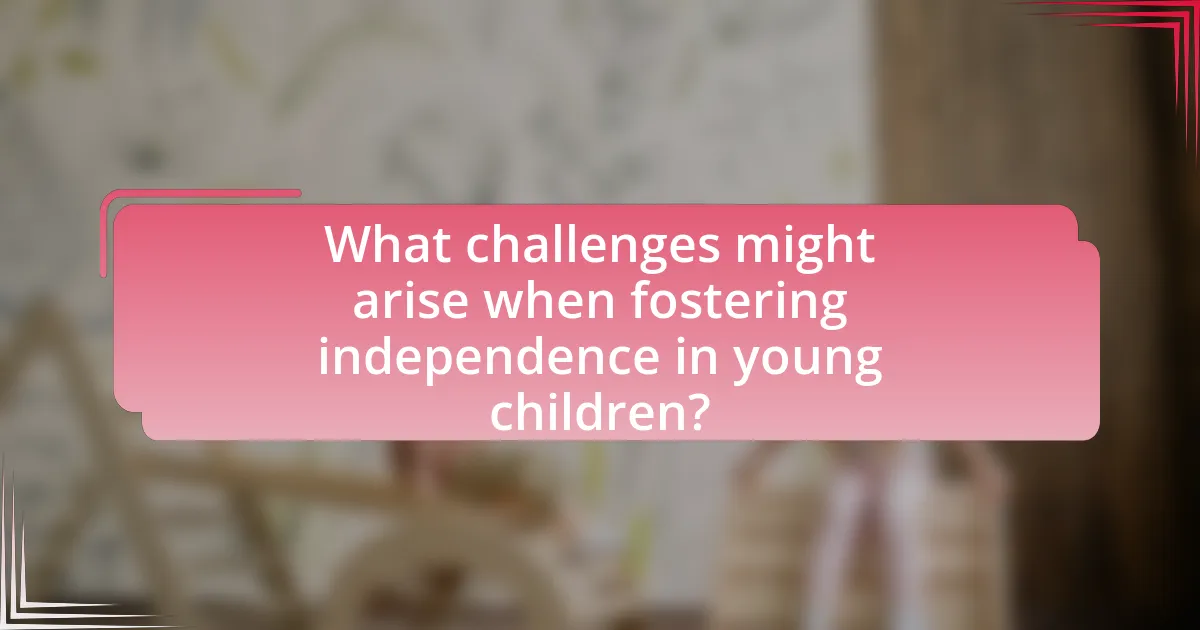
What challenges might arise when fostering independence in young children?
Fostering independence in young children can lead to challenges such as resistance to new responsibilities, fear of failure, and difficulty in decision-making. Children may resist taking on tasks independently due to a lack of confidence or fear of making mistakes, which can hinder their willingness to try new things. Additionally, young children often struggle with making decisions, leading to frustration for both the child and the caregiver. Research indicates that children aged 3 to 5 years are still developing their executive functioning skills, which are crucial for self-regulation and independent task completion. This developmental stage can result in challenges when encouraging autonomy, as children may not yet possess the necessary skills to manage tasks without assistance.
How can parents address resistance to independence?
Parents can address resistance to independence by gradually introducing opportunities for self-reliance while providing support and encouragement. This approach allows children to build confidence in their abilities. For instance, parents can start by assigning age-appropriate tasks, such as dressing themselves or making simple snacks, which fosters a sense of accomplishment. Research indicates that children who are given responsibilities develop better problem-solving skills and self-esteem, as highlighted in a study published in the Journal of Child Development, which found that autonomy-supportive parenting leads to increased motivation and independence in children. By balancing guidance with freedom, parents can effectively reduce resistance and promote independence.
What are common fears children have about being independent?
Common fears children have about being independent include fear of failure, fear of the unknown, and fear of separation from caregivers. Children often worry that they will not succeed in new tasks or responsibilities, which can lead to anxiety about trying things on their own. Additionally, the unfamiliarity of new situations can create apprehension, as children may feel unprepared to handle challenges without adult support. Separation anxiety is also prevalent, as children may fear being away from their parents or guardians, leading to feelings of insecurity. These fears are supported by developmental psychology research, which indicates that children typically seek reassurance and guidance from caregivers when facing new experiences.
How can parents help children overcome these fears?
Parents can help children overcome fears by providing a supportive environment that encourages open communication and gradual exposure to the feared situations. This approach allows children to express their feelings and understand that their fears are valid. Gradual exposure, such as role-playing or visiting the feared place in a safe context, helps desensitize children to their fears. Research indicates that children who engage in gradual exposure with parental support show a significant reduction in anxiety levels, as evidenced by a study published in the Journal of Anxiety Disorders, which found that structured exposure therapy can lead to a 50% decrease in fear responses.
What are the signs that a child is ready for more independence?
A child is ready for more independence when they demonstrate self-sufficiency in daily tasks, such as dressing themselves or managing personal hygiene. Signs include the ability to follow simple instructions without constant supervision, expressing a desire to make choices, and showing confidence in trying new activities. Research indicates that children who engage in problem-solving and decision-making exhibit greater independence, as noted in studies by the American Academy of Pediatrics, which emphasize the importance of fostering autonomy for healthy development.
How can parents assess their child’s readiness for new responsibilities?
Parents can assess their child’s readiness for new responsibilities by observing their ability to complete age-appropriate tasks independently. This includes evaluating the child’s problem-solving skills, emotional regulation, and willingness to take initiative. Research indicates that children who demonstrate self-control and can follow multi-step instructions are often more prepared for increased responsibilities. For instance, a study published in the journal “Child Development” found that children who exhibit higher levels of executive function are better equipped to handle tasks such as managing homework or chores. By monitoring these behaviors, parents can make informed decisions about when to introduce new responsibilities to their child.
What practical tips can help foster independence in young children?
To foster independence in young children, encourage them to make choices and solve problems on their own. Allowing children to select their clothes, snacks, or activities promotes decision-making skills and boosts their confidence. Research indicates that children who engage in self-directed activities develop better problem-solving abilities and a sense of autonomy. Additionally, providing age-appropriate tasks, such as dressing themselves or helping with simple chores, reinforces their capability and responsibility. Studies show that children who participate in household tasks exhibit higher self-esteem and independence.
How can parents set up a routine that encourages independence?
Parents can set up a routine that encourages independence by establishing consistent daily schedules that include age-appropriate tasks for children. This structure allows children to understand expectations and develop self-management skills. For example, assigning specific chores, such as making their bed or preparing simple snacks, fosters a sense of responsibility and accomplishment. Research indicates that children who engage in regular routines are more likely to exhibit self-discipline and confidence, as routines provide a framework for decision-making and problem-solving.
What resources are available for parents seeking to promote independence?
Parents seeking to promote independence in their children can access various resources, including books, workshops, and online courses. Notable books such as “The Whole-Brain Child” by Daniel J. Siegel and Tina Payne Bryson provide strategies for fostering autonomy through understanding child development. Workshops offered by organizations like the National Association for the Education of Young Children (NAEYC) focus on practical techniques for encouraging self-sufficiency. Additionally, online platforms such as Coursera and Udemy offer courses specifically designed for parents to learn effective methods for promoting independence in young children. These resources are validated by research indicating that fostering independence enhances children’s problem-solving skills and self-esteem.










